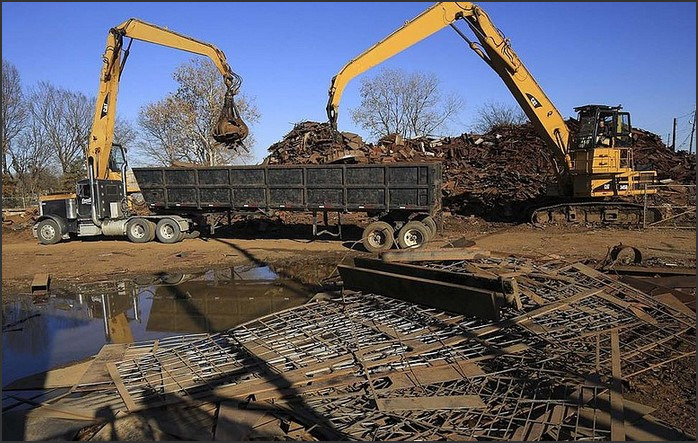Chicago Scrap Yards: Navigating Recycling and Metal Salvage

Source : https://wehco.media.clients.ellingtoncms.com
Chicago Scrap Yards are a crucial part of the city’s recycling and metal salvage operations. These facilities play a significant role in the collection, processing, and recycling of various types of scrap metals, contributing to environmental sustainability and the economy. They offer services to both individuals and businesses, accepting a wide range of materials from old vehicles to household appliances. Navigating through these scrap yards can be a complex process due to the variety of metals accepted and the fluctuating market prices. However, understanding their operations can lead to profitable and eco-friendly disposal of scrap metal.
Understanding the Intricacies of Chicago Scrap Yards: A Comprehensive Guide to Recycling and Metal Salvage
Chicago, a city renowned for its architectural prowess and industrial heritage, is also home to a thriving network of scrap yards. These establishments play a crucial role in the city’s recycling efforts and metal salvage operations. Understanding the intricacies of Chicago scrap yards can provide valuable insights into the city’s commitment to sustainability and resource conservation.
Scrap yards in Chicago are essentially recycling centers that specialize in the collection, processing, and resale of scrap metal. They serve as a critical link in the recycling chain, transforming discarded metal items into valuable raw materials for various industries. The process begins with individuals or businesses selling their scrap metal to the yards. This could range from old appliances and vehicles to construction waste and industrial by-products.
Once the scrap metal arrives at the yard, it undergoes a meticulous sorting process. Different types of metals, such as iron, steel, aluminum, copper, and brass, are separated based on their properties and potential uses. This is a crucial step as the value of scrap metal is largely determined by its type and quality. The sorted metals are then prepared for recycling through a series of processes including shredding, shearing, and baling.
The recycled metal is then sold to manufacturers who use it to produce a wide range of products, from cars and appliances to building materials and packaging. This cycle of collection, recycling, and reuse not only conserves natural resources but also reduces energy consumption and greenhouse gas emissions associated with mining and metal production.
Navigating the world of Chicago scrap yards can be a daunting task, especially for first-time sellers. However, with a basic understanding of how scrap metal pricing works, one can make informed decisions and potentially earn a significant return. Prices fluctuate based on market conditions and the type of metal, with precious metals like copper and brass typically fetching higher prices than common metals like steel and aluminum. It’s also worth noting that clean, uncontaminated metal generally commands a higher price than mixed or dirty metal.
In addition to understanding pricing, it’s also important to be aware of the legal aspects of selling scrap metal. Chicago, like many other cities, has strict regulations in place to prevent metal theft. Sellers are required to provide identification and, in some cases, proof of ownership for the scrap metal they’re selling. Scrap yards are also required to keep detailed records of their transactions to aid law enforcement in tracking stolen metal.
Chicago’s scrap yards are more than just repositories for discarded metal. They are vital cogs in the city’s recycling machine, contributing to environmental sustainability and economic growth. By understanding their operations and the broader context in which they operate, one can appreciate the value they bring to the city and the planet. Whether you’re a homeowner looking to dispose of an old appliance, a contractor with construction waste, or a business with industrial scrap, Chicago’s scrap yards offer a responsible and potentially profitable solution for your metal recycling needs.In conclusion, Chicago Scrap Yards play a crucial role in recycling and metal salvage operations. They provide an efficient system for the disposal of scrap metal, contributing to environmental sustainability by reducing waste and promoting the reuse of materials. Navigating these yards can be complex due to the vast variety of metals accepted and the regulations surrounding their disposal. However, with proper understanding and guidance, they serve as valuable resources for individuals and businesses in Chicago.





